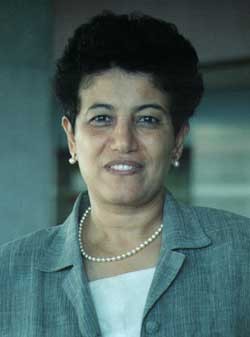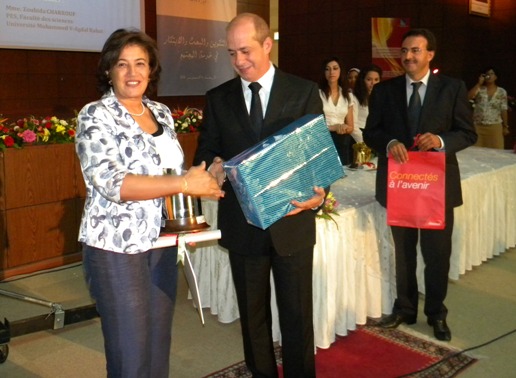Dr Zoubida
 Professor Zoubida Charrouf is a researcher in Science Faculty of Mohamed V. University in Rabat, capital of Morocco. Her interest in argan tree have helped to promote argan oil as a cultural and environmental heritage of Morocco.
Professor Zoubida Charrouf is a researcher in Science Faculty of Mohamed V. University in Rabat, capital of Morocco. Her interest in argan tree have helped to promote argan oil as a cultural and environmental heritage of Morocco.
Her work combined three important factors that are link to argan trees: women’s emancipation, the argan tree products, and the conservation of an indigenous species.
Certainly, she is the argan trees’ biggest friend.
Fascinated by chemistry and plants she select Argania spinosa (Argan tree) as the subject of her doctoral dissertation in 1984.
She is saying:
“For me, plants are something with which one dialogues. They’re useful. Why the argan? Because it’s typically Moroccan. And also because it’s threatened by extinction.”
Although the argan is Morocco’s second most common tree species, more than third of the forest has disappeared in the past century due to overgrazing.
Her goal was to research the argan’s undiscovered properties, commercialize a product, but also to help the local tribes take proper advantage of the trees.
“…that way, they’ll be motivated to protect it and replant it.” -she says.
Only by increasing the scale of commercial production of argan oil, farmers could be motivated to remain on the land.
“Since women are the keepers of tradition, the ones who have the ancestral know-how for producing argan oil, it seemed logical to turn to them first. Thus the idea of founding a women’s cooperative.”
She established the country’s first-ever argan oil processing cooperatives.
For the scepticism of local officials and reluctant Berber husbands first cooperative was composed almost exclusively of widows and divorced women. With time and economic pressure, seeing that cooperative has proved its value, many unemployed husbands change their minds and wives started to be a source of steady income for their families.
Research have enabled Dr Zoubida to improve the technology of oil production, to confirm certain uses in traditional medicine, to increase the shelf life of the oil and to improve its packaging.
“That’s when I told myself that it made no sense that, at the end of the 20th century, this oil that has so many virtues – nutritional, cosmetic, therapeutic – can be as debased as it was. It’s not right that it’s still sold on the side of the road, in recycled, chipped bottles. It’s not right either that it’s still produced by grinding the nuts between rocks.”
She is convinced that by educating the community about value of argan tree she is protecting argan forest and improve women’s lives. The project provide income for families but also can offer training in literacy, marketing, quality control, and other subjects.
‘We have gotten out of of the house.’ – cooperative women say
The argan oil’s success surprised even the founder of the idea. “We had no money for publicity” – she was saying. Today, argan oil benefits topic was covered in every style magazine, many newspapers and even in few financial publications.
Dr Charrouf’s work is not done yet. Undiscovered potential of argan oil constatntly fascinate her .
“We’ve only done 10 percent of what should be done in the argan forest,” she says.
There are other products to be developed.
“Extraordinary things can be done with the extraction residues, with the leaves, wood pulp, wood – all can be exploited industrially. I’m staying with it so that as many benefits as possible remain in Morocco,” she adds.
Dr Zoubida Charrouf has received Morocco’s Grand Prize for Invention and Research in Science and Technology in October 2010.

